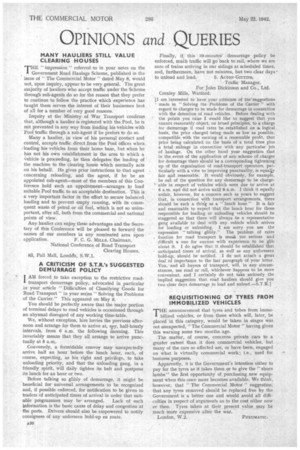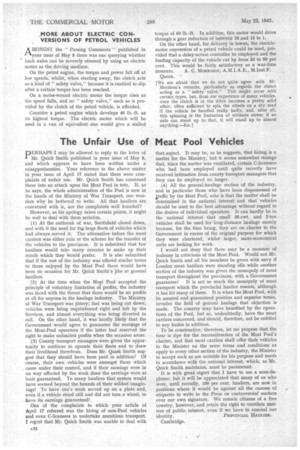OPINIONS and
Page 32

Page 34

If you've noticed an error in this article please click here to report it so we can fix it.
UERIES
MANY HAULIERS STILL VALUE CLEARING HOUSES THE " impression '' referred to in your notes on the Government Road Haulage Scheme, published in the issue of " The Commercial Motor" dated May .8, would not, upon inquiry, appear to be very general. The great majority of hauliers who accept traffic under the Scheme through sub-agents do so for the reason that they prefer to continue to follow the practice which experience has taught them serves the interest of their businesses best of all for a number of very good reasons.
Inquiry at the Ministry of War Transpori confirms that, although a haulier is registered with the Pool, he is not prevented in any way from loading his vehicles with Pool traffic through a sub-agent if he prefers to do so.
Many a haulier, in view of his personal contact and control, accepts traffic direct from the Pool offices when.
• loading his vehicles from their home base, but when he has not his own establishment in the area to which a ifehicle is proceeding, he then delegates the loading of the machine to the clearing house which normally acts on his behalf. He gives prior instructions to that agent concerning reloading, and the agent, if he be an appointed sub-agent—most of the members of this Corrference hold such an appointment—arranges to load suitable Pool traffic to an acceptable destination. This is a very important factor in the effort to secure balanced loading and to prevent empty running, with its consequent waste of petrol or oil fuel, which is not so unimportant, after all, both from the commercial and national points of view.
Any haulier can enjoy' these advantages and the Secretary of this Conference will be pleased to forward the names of our members in any nominated area Upon
application. F. C. G. MILLS, Chairman, National Conference of Road Transport
. Clearing Houses. 83, Pall Mall, Londclb, S.W.1.
A CRITICISM OF S.T.R.'s SUGGESTED DEMURRAGE POLICY I AM forced to take exception to the restrictive road' transport demurrage policy, advocated in particular
in your article "Difficulties of Classifying Goods for Road Transport " in your series "Solving the Problems of the Carrier." This appeared on• May 8.
You should be perfectly aware that the major portion of terminal delays to road vehicles is occasioned through an abysmal disregard of any working time-table.
We, without exception, hire lorries the previous afternoon and arrange for them to arrive at, say, half-hourly intervals, from 6 a.m. the following morning. This invariably means that they all arrange to arrive punctually at 8 a.m.
Conversely, a formidable convoy may unexpectedly arrive half an hour before the lunch hour, each, of course, expecting, as his, right and privilege, to take unloading priority, and that the unloading gang, in a friendly spirit, will daily tighten its belt and postpone its lunch for an hour or two.
Before talking so glibly of demurrage, it might be beneficial for universal arrangements to be recognized and, if possible enforced, for notification to be given to traders of anticipated -times of arrival in order that suitable programmes may bearranged. Lack of such information is the basic cause of delay and congestion at the ports. Drivers should also be empowered to notify consignees of any unforseen hold-up en route. Finally, if, this 10-minutes' demurrage policy be enforced, much traffic will go back to rail, where we are sure of trains arriving in our sidings at scheduled times, and, furthermore, have not minutes, but two clear days
to unload and load. S. ACTON-Gil:TINS, • • Traffic Manager, For John Dickinson and Co., Ltd. Croxley Mills, Watford.
[I am interested to have your criticism of the'suggestions
• made in " Solving the Problems of the Carrier with regard to charges to be made for demurrage in connection with the detention of road vehicles. Before dealing with the points you raise I would like to suggest that you cannot reasonably object, on broad principles, to a charge for demurrage it road rates be established on a logical basis, the price charged being made as low as possible, compatible with the earning of a reasonable profit, that price being calculated on the basis of a total time plus a total mileage in connection with any particular job of haulage. On the other hand your suggestion that in the event of the application of any scheme of charges for demurrage there should be a corresponding tightening up of the organization of road-transport operators, particularly with a view to improving punctuality, is equally fair and reasonable. It would obviously, for example, be out of the question for any demurrage to be charge' able in respect of vehicles which were due to arrive at 6 am, and did not arrive until 8 a.m. I think it equally unfair, however, for a concern such as yours to suggest that, in connection with transport arrangements, there should be such a thing as a " lunch hour." It is fair and reasonable to expect that the lunch hour for those responsible for loading or unloading vehicles should be staggered so that there will always be a representative gana° aVailable to deal with any vehicle which arrives for loading or unloading. I am sorry you use the expression " talking • glibly." The 'problem of rates fixation for road transport is mue..n too serious and difficult a one for anyone with experience to be glib about it. I do agree t]iatit should be established that anticipated •times of arrival, as well as any unforeseen hold-up, should be notified. I do not attach a great deal of importance to the last paragraph of your letter. You,-and all buyers of transport, will, in any circumstances, use road or rail, whichever happens to be more convenient, and I certainly do not take seriously the implied suggestion that road hauliers should give you two clear days demurrage to load and unload.—S.T.R.] REQUISITIONING OF TYRES FROM IMMOBILIZED VEHICLES THE announcement that tyres and tubes from immobilized vehicles, or from those which will, later, be placed in this category, would be taken in stages was
not unexpected, " The Commercial Motor " having given this warning some two months ago.
The matter, of course, concerns private cars to a greater extent than it does commercial vehicles, but
many of the cars so affected are, or have been, engaged On what is virtually commercial work; i.e., used for business purposes.
Apparently, it is the Government's intention either to pay for the tyres as it _takes them or to give the "shorn lambs: the first opportunity of purchasing new equipment when this once more becomes available, We think, however, that " The Commercial Motor" suggestion, that any tyres removed should be replaced free by the Government is:a better one and would avoid all difficulties in respect of arguments as to the cost either now or then. Tyres taken at their present value may be much more expensive after the war.
London, W.2. PNEUMATIC. MORE ABOUT ELECTRIC CONVERSIONS OF PETROL VEHICLES MONGST the "Passing Comments " published in r-lyour issue of May 8 there was one querying whether back axles can be severely stressed by using an electric motor as the driving medium.
On the petrol engine, the torque and power fall off at low speeds, whilst, when starting away, the clutch acts as a kind of " safety valve," because it is enabled to slip after a certain torque has been reached.
On a series-wound electric motor the torque rises as the speed falls, and no "safety valve," such as is provided by the clutch of the petrol vehicle, is afforded.
Consider a petrol engine which develops 40 lb.-ft. as its highest torque. The electric motor which will be used in a van of equivalent size would give a stalled torque of 60 lb.-ft. In addition, this motor would drive through a gear reduction of between 10 and 15 to 1.
On the other hand, for delivery in towns, the electricmotor conversion of a petrol vehicle could be used, provided that a delay-action controller be employed and the loading capacity of the vehicle cut by from 33 to 50 per cent. This would be fairly. satisfactory as a war-time
measure. A. C. Mc:atm-so:a, A.M.I.A.E., M.Inst.F. Quorn. • [We are afraid that we do not quite agree with Mr. Morrison's remarks, particularly as regards the clutch acting as a "safety valve." This might occur with certain types, but, from our experience of many vehicles, once the clutch is in the drive becomes a pretty solid affair, often sufficient to spin the wheels on a dry road if the vehicle be handled really badly, and, after all, this spinning is the limitation of ultimate stress; if an axle can stand up to that, it will stand up to almost anything.—.En.]




















































